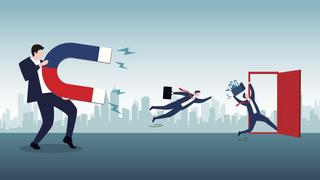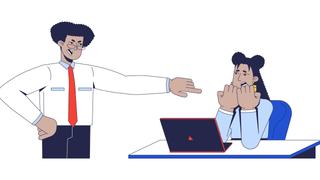Information Overload
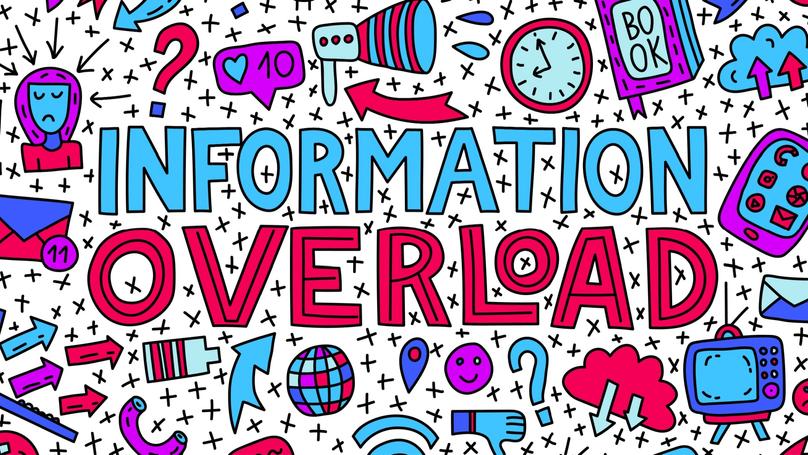
What is Information Overload?
Information overload is one of the most acute problems of modern society, which continues to be exacerbated by the widespread digitalisation of industries and activities and the increasing use of the latest information and communication technologies. It means an overabundance, an excessive amount of all kinds of data entering the consciousness, which makes a person unable to understand a situation and decide on solutions. Thus, in the digital age, each of us has access to an incredible amount of knowledge accumulated throughout the history of humankind. However, although information has become readily available and mass-produced, this has disadvantages. Therefore, in psychology and social sciences, information overload is also called infoxication or information obesity.
Here are some of its main signs:
- Low concentration of attention;
- An inability to focus on a specific task or the so-called "wandering mind" syndrome;
- Increased fatigue;
- Difficulty in fact-checking;
- Emotional overstrain;
- Social media addiction.
As a rule, information overload is associated with a large amount of information about a particular process or phenomenon and an overabundance of daily information - for example, endless social media feeds, news streams, regular media publications, and even socialising with friends. Also, information overload occurs when contradictory and false information, fake data, and factoids are present.
Interestingly, the term "information overload" was first used by researcher Bertram Gross long before the Internet and widespread digitalisation. He mentioned it in his book "The Managing of Organizations" in 1964. However, philosopher and sociologist Alvin Toffler popularised the idea of information overload in his bestseller "Future Shock" in 1970. Since then, the concept has continued to gain momentum, and information overload increasingly impacts consumers.
Some Examples of Information Overload in Communication
The so-called infoxication occurs when a person receives more information than they can process. That leads to suppression of feelings and emotions, deterioration of interaction, communication breakdown, inability to decide on a solution and conflicts. A vivid example of information overload in communications can be a modern office, where employees get snowed under with a continuous flow of emails, calls, business meetings and scheduled events. This pace and the accompanying mass of data become a fertile ground for reduced productivity, burnout, and stress.
Information overload also occurs when you receive many new tasks from your supervisor. Such large volumes of information make processing, understanding, and taking further action challenging. Infoxication can also be observed at meetings or planners, when instead of discussing the most urgent problem that you must solve, the boss switches to multiple nuances, moves away from the topic of conversation and, as a result, wastes time.
Information overload also occurs when a subordinate sends you an overly detailed long report from which it is difficult to extract the necessary data. In addition, long scientific conferences with numerous participants, their reports and presentations are also accompanied by an overabundance of various data and, as a result, information fatigue syndrome. In short, infoxication awaits us at every step. For example, we are surrounded by excessive advertising, an endless stream of news from various channels of information, and legal documents containing a lot of clarifications and complex formulations. In such circumstances, it becomes increasingly difficult to maintain concentration and conscious thinking, be in harmony with oneself and one's environment, set priorities correctly and make well-considered decisions.
Thus, information overload in communication threatens to reduce interaction quality, worsens interpersonal communications, and leads to misunderstandings and decreased concentration. Therefore, such a factor as infoxication is of paramount importance in any communication.
Causes of Information Overload

At the time when researchers Gross and Toffler wrote about information overload, this phenomenon was faced mainly by scientists and other specialists who worked with large amounts of data. But by the end of the last century, the problem of information intoxication affected almost everyone. According to statistics from the OpenText digital platform, about 80% of people worldwide suffer from information overload. At the same time, the amount of data continues to proliferate, and, according to Statista's report, by 2025, their volume will reach 180 zettabytes.
The following factors caused a global oversupply of information:
- Availability of any Information. For Internet users, there are virtually no limits. If desired, you can find private information, classified data, scientific materials and other information previously inaccessible to the uninitiated. Simultaneously, making special efforts, such as visiting the library, looking for rare books, or reading dictionaries, is unnecessary. It creates passivity, which leads to mindless consumption of information.
- Increasing amounts of data. As a rule, the more information we consume, the faster we stop analysing, checking and critically thinking about it. Nowadays, most consumers unconsciously follow the appearance of new information but do not think about its meaning because they are physically unable to process this array of information.
- The emergence of new communication channels, that is, various messengers, social networks, TV channels, and radio stations. Moreover, email, telephone and real-life communication have not disappeared anywhere. We are constantly switching from one channel of communication to another, which affects our productivity and requires more and more time for rest.
- Multitasking. Parallel work on several things has become possible thanks to the emergence of different communication channels. For example, we can watch TV and check our email, do household chores, and chat via messenger simultaneously, which leads to information overload.
- News consumption. Researchers of modern communications agree that news background contributes to information overload and decreased concentration and productivity during the day.
There are many more causes of information intoxication. Strange as it may seem, constant and quick access to online courses and additional knowledge and skills are the most critical factors in overload. Many educational platforms and the ability to supplement one's knowledge around the clock cause fatigue. Moreover, operative information overload also occurs if you treat learning to acquire new skills and self-improvement as leisure activities. But it is just as much work, as, for example, cleaning the house, especially if it is difficult for you. So don't forget to make time for leisure and self-care.
Why Information Overload Is a Problem, and What Are the Consequences of Infoxication?
Information overload is now an integral factor in modern society, which leads to reduced ability to work and work efficiency, as well as rapid fatigue and anxiety. Other consequences of overload include:
- Deterioration of memory and attention;
- Disturbance of concentration;
- Reduced productivity;
- Professional burnout;
- Increased anxiety, tension, and risk of chronic stress;
- Physical health problems, sleep and eating disorders.
In other words, trying to cope with ever-increasing information flows causes both mental and physical problems. At the same time, our dependence on gadgets and new technologies is increasing, exacerbating the already significant consequences of information overload.
As a result, an information-overloaded person becomes more irritable and moody. Moreover, they cannot always control their actions and consciously react to external factors. All this is called vivid symptoms of information fatigue syndrome. This psychological condition leads to incorrect assessments of reality, false inferences, making the wrong decisions and coming up with faulty solutions. Excessive amounts of new but not always essential and helpful information lead to the so-called "analytical paralysis," i.e., a state in which a person has a lot of knowledge but cannot apply it in practice. Therefore, it is imperative to understand how to avoid information overload to stay in touch with reality.
How to Avoid Information Overload
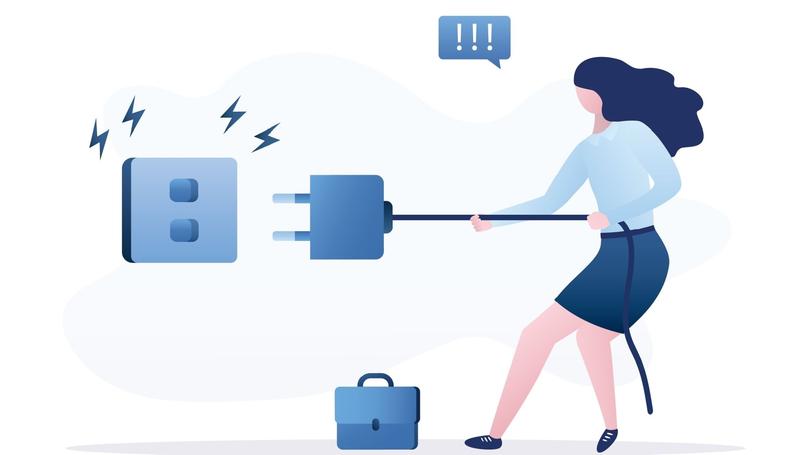
It is almost impossible to avoid information overload altogether. To do so, you should isolate yourself from society, delete social networks, and stop reading the news and watching TV programmes. I agree; too many restrictions significantly reduce the quality of our lives. Therefore, the best way to avoid information overload is periodic prevention. Treat your daily routine consciously and follow recommendations.
1. Practise Digital Detox
Make it a habit to spend at least one day a week without gadgets or any other source of information. For example, have a digital diet on your day off. On that day, don't look at social media, don't check your email, and forget about the news and all sorts of distractions. To ensure that nothing disturbs you or makes you snap, go to the countryside and have a picnic, deliberately not taking your digital devices with you. You can also play sports, take time to read a book that's been gathering dust on the shelf waiting to be read, or do other hobbies that don't involve tech devices. So if your hobby is computer games, you should put them aside for the next day.
2. Engage in Time Management
It is the name given to a specific strategy for improving personal efficiency, which involves organising and scheduling time to maximise productivity and performance. Time management includes many tools, techniques, and practices for managing your resources. For example, if you are overwhelmed with work but it is unclear what to do first, you should allocate tasks competently. The Eisenhower matrix will help you with this, allowing you to easily determine which tasks are more urgent and essential and which you can easily do later. The "Frog Method" is equally popular and effective: business coach Brian Tracy suggests that you first perform the most challenging task and then switch to simpler ones, i.e. "eat a frog in the morning". After all, the brain is least loaded with information in the morning, so you can cope with a difficult task much faster and easier. Another technique is "1-3-5" or "The Principle of Nine Things." According to it, you should complete one prominent task, three medium-sized tasks and five small ones during the day. This number and ratio of tasks will help you protect yourself from information overload, avoid being distracted by external factors, and spend the day productively.
3. Forget Multitasking
Multitasking is the tendency of a person to perform several tasks at once, or to switch quickly from one to another. At first glance, this may seem sensible because if you do several things at once, you can get through them faster. In reality, however, you risk becoming a victim of information overload and burnout. Our brain is organised so that it can concentrate only on one thing. Scientists have long proved that when a person does several things simultaneously, the quality of their fulfilment suffers. In this case, the more tasks they solve at the moment, the worse the result will be. Therefore, try to do one thing in a certain period. So you will cope with it faster and more efficiently; otherwise, productivity will suffer, and you will experience not only informational but also physical fatigue syndrome.
4. Learn to Prioritise
It would be best if you learned to prioritise to avoid drowning in a sea of tasks and competently spend your resources. Distribute daily tasks according to their importance and value. Believe me, there is hardly any place for mindless surfing on the Internet, scrolling through social media or other activities that contribute to information intoxication. Preventing overload involves completely rejecting so-called "digital gum," i.e. useless information consumed unconsciously.
5. Alternate Intellectual Labour with Physical Activity
Try to arrange regular walks, maintain a healthy lifestyle, and go to the gym or swimming pool. In other words, it is necessary to load not only our brain, consuming and producing more information, but also to combine it with different types of physical activity. Simple aerobic training or coordination exercises certainly won't hurt anyone!
How to Deal with Information Overload
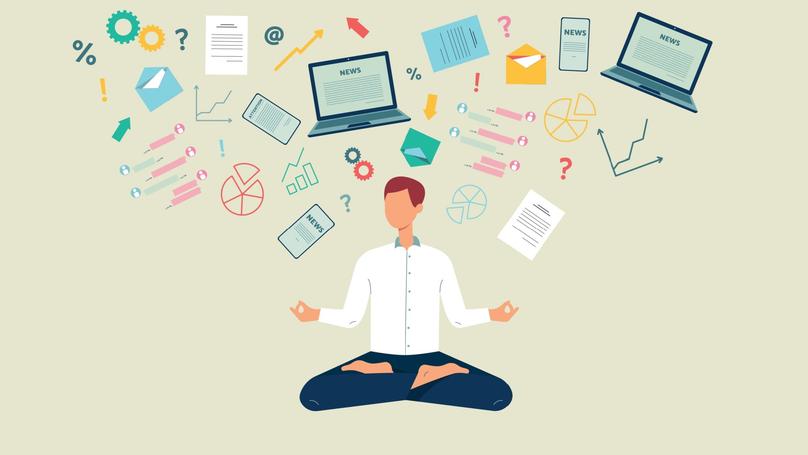
But what do you do if information overload has already occurred, and you feel its effects? There are several ways to deal with information overload.
1. Limit the Sources of Incoming Information
Carefully study which channels, groups, and communities you subscribe to on all social platforms. You don't have to follow dozens of media outlets or bloggers to stay informed. Choosing a few quality and trusted sources you should subscribe to is wiser. Feel free to unsubscribe from those who are no longer an authority to you, whom you no longer trust or whose opinions you disagree with. It will allow you to eliminate distractions, avoid information noise, and focus solely on information that seems important and interesting to you.
2. Eliminate Distractions
Setting boundaries and eliminating all external stimuli that interfere with your activities is critical. For example, switch off notifications in messengers and emails or put your phone on "Do Not Disturb" mode for a certain period. It will help you disconnect from the outside world, spend your time productively and consciously, and avoid information overload.
3. Systematise Your Data
Try to manage your data. For example, do not leave dozens of tabs open in your browser, but add sites of interest to your bookmarks. Note-taking apps and online notepads can help you organise your data by highlighting the most critical parts of your data. It will help you process information more quickly, and in the future, you will be able to prioritise and effectively use the various time management techniques mentioned above.
4. Use the Method of Grouping Tasks
This way, you combine similar tasks into a particular series and perform them one after another. This approach helps you get things done faster and avoid wasting time. For example, grouping can be done by type of activity, the status of importance and complexity, time, place and so on. So, instead of giving yourself ten minutes to check your email, allocating a whole hour for all online communication is better. It will negate distractions, reduce passive data consumption and increase personal efficiency.
5. Don't Forget About Mindfulness Techniques
Mindfulness is an effective practice for training attention and self-awareness. Developing mindfulness will avoid passive data consumption, information fatigue, and infoxication syndrome. Immersion in mindfulness practice is best started by reading literature on the topic, such as David Lynch's "Catching the Big Fish: Meditation, Consciousness, and Creativity." In it, the famous director explains how the unique transcendental meditation technique helps him find valuable ideas in the depths of consciousness and realise them. By the way, meditation allows you to develop mindfulness, find harmony with yourself and the outside world, and prevent information overload and unconscious consumption of information. Thus, the book "The Joy of Living: Unlocking the Secret and Science of Happiness" describes techniques for improving your life, such as meditation for researching and correcting your consciousness. Its author, Yongey Mingyur Rinpoche, talks about the formation of negative habits and reveals several ways to get rid of them. Remember that such habits include passivity in the perception of new information.
Conclusions
Thus, it is not possible to avoid information overload altogether. This is due to the development of society, the regular appearance of the latest technologies and means of communication, and the digitalisation of life. The only thing we can do to protect ourselves from infoxication is to follow all the above recommendations and thus minimise the consequences and impact of overload on our bodies. Take a conscious approach to your professional activity and personal life, observe work-life balance, and use time management techniques. It will empower you to cope with feelings of depression, tension, and inability to concentrate. Conscious consumption of information and reasonable restrictions, such as digital detox, will help you eliminate the symptoms of information fatigue and increase productivity and personal efficiency.
